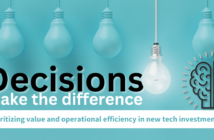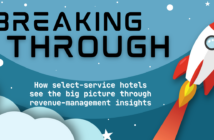A great guest experience requires digital transformation
Hospitality’s digital transformation was a top priority before COVID-19, but the pandemic accelerated the adoption of automated tools. We saw hospitality organizations begin using updated technologies such as machine learning and replacing outdated and siloed legacy systems with cloud-based tools. The pandemic also led to many transformations in how the hospitality industry collaborates, leverages data, and shares information. As digital technologies transform the hospitality industry, here’s how digital transformation is reshaping the guest experience.
1. A MOBILE-FIRST APPROACH
 Mobile phones and tablets support a wide variety of communication channels – from email and voice to chat and text – creating a sea of opportunities for hotels to provide guests with an exceptional guest experience. Hotels can benefit from allowing guests to use personal smartphones and hotel-supplied bedside tablets for more than customer service, bookings, and mobile check-in. Integrated mobile-first hospitality-management software can enable guests to use their phone to unlock their hotel room, order room service, make payments, retrieve luggage or bags, and request housekeeping items such as extra towels. Algorithms can even make recommendations based on a guest’s browsing history offering nearby restaurants and entertainment suggestions and showing QR code pop-up messages to provide exclusive discounts and coupons. It’s also the ideal solution for guests who dread calling the front desk, where it will ring 20 times before they’re quickly placed on hold for easy-to-answer questions.
Mobile phones and tablets support a wide variety of communication channels – from email and voice to chat and text – creating a sea of opportunities for hotels to provide guests with an exceptional guest experience. Hotels can benefit from allowing guests to use personal smartphones and hotel-supplied bedside tablets for more than customer service, bookings, and mobile check-in. Integrated mobile-first hospitality-management software can enable guests to use their phone to unlock their hotel room, order room service, make payments, retrieve luggage or bags, and request housekeeping items such as extra towels. Algorithms can even make recommendations based on a guest’s browsing history offering nearby restaurants and entertainment suggestions and showing QR code pop-up messages to provide exclusive discounts and coupons. It’s also the ideal solution for guests who dread calling the front desk, where it will ring 20 times before they’re quickly placed on hold for easy-to-answer questions.
Hotels also are improving the mobile app user experience. In addition to booking options, remote check-in and checkout, room key functionality, and guest services, hotels are adding new benefits like offering live chat with hotel staff, hotel maps and resort activities. Some are taking it a step further by providing personalized and timely information such as flight schedules, ticket availability for local entertainment and sporting events, and restaurant reservations all within their app.
2. RAPID BUSINESS INSIGHTS
 Data governance plays a critical role in a hotel’s ability to leverage data to make informed decisions. Data becomes worthless when a hotel doesn’t know where it came from or how it was collected, not to mention the absence of a solid data-management plan. Poor data undermines critical business initiatives, leading to operational inefficiencies and bad insights, and jeopardizes the guest experience. Hospitality organizations need to implement a data-governance program that integrates data quality and data management. Not only will a formal program align people, processes, and technology, thus helping them to understand data and transform it into an enterprise asset, but it helps users gain data visibility. As a result, business users are empowered to quickly find, understand, and apply the right data sources for analytics and make the right decisions to drive revenue, marketing, distribution, and hotel management. Digital transformation allows hoteliers to understand guests in new ways, using that information to identify opportunities, optimize products and services, and automate solutions.”
Data governance plays a critical role in a hotel’s ability to leverage data to make informed decisions. Data becomes worthless when a hotel doesn’t know where it came from or how it was collected, not to mention the absence of a solid data-management plan. Poor data undermines critical business initiatives, leading to operational inefficiencies and bad insights, and jeopardizes the guest experience. Hospitality organizations need to implement a data-governance program that integrates data quality and data management. Not only will a formal program align people, processes, and technology, thus helping them to understand data and transform it into an enterprise asset, but it helps users gain data visibility. As a result, business users are empowered to quickly find, understand, and apply the right data sources for analytics and make the right decisions to drive revenue, marketing, distribution, and hotel management. Digital transformation allows hoteliers to understand guests in new ways, using that information to identify opportunities, optimize products and services, and automate solutions.”
3. PRIORITIZING PERSONALIZATION
 Guests today demand personalization, whether automatically being assigned a room on a high floor and away from the elevator or ensuring that a feather-free pillow provides extra comfort on the bed.
Guests today demand personalization, whether automatically being assigned a room on a high floor and away from the elevator or ensuring that a feather-free pillow provides extra comfort on the bed.
Like the retail industry, the average transaction value and conversion rate increases when offering guests personalized recommendations that are relevant and meaningful. It makes a guest feel recognized and valued while increasing brand loyalty. As data governance takes priority and data silos come down, increasing cross-collaboration between departments, personalization will become more effective. Hotels can micro-segment audiences, develop multichannel strategies, and further leverage artificial intelligence (AI) for consistency. Hotels can respond quickly to changing guest expectations, enhance communications across all channels, provide a stellar guest experience, and integrate data between all touchpoints to identify guest trends and preferences. The result is more revenue, increased guest retention, and differentiation from the competition.
4. THE GROWTH OF AI
 AI solutions with machine learning algorithms offer several solutions in the hospitality industry, including revenue predictions, driving down guest acquisition costs, and perfecting guest-retention strategies. After all, loyal guests are the backbone of any hospitality business. AI also is actively leveraged in the hospitality industry using virtual concierges, natural language processing (NLP), and chatbots. In AI, data is collected from websites, guest interactions via the hotel app, chatbots, purchase history, food preferences, stored payment options, spa and amenity usage, and more. The software and algorithms automatically learn from the guest’s patterns to connect and derive meaning from the information, resulting in a more personalized guest experience.
AI solutions with machine learning algorithms offer several solutions in the hospitality industry, including revenue predictions, driving down guest acquisition costs, and perfecting guest-retention strategies. After all, loyal guests are the backbone of any hospitality business. AI also is actively leveraged in the hospitality industry using virtual concierges, natural language processing (NLP), and chatbots. In AI, data is collected from websites, guest interactions via the hotel app, chatbots, purchase history, food preferences, stored payment options, spa and amenity usage, and more. The software and algorithms automatically learn from the guest’s patterns to connect and derive meaning from the information, resulting in a more personalized guest experience.
5. REPLACING MANUAL TASKS
 Many traditional hotel roles and processes are time consuming, error prone, cost more, and cause bottlenecks to other services. With many conventional methods no longer applicable to the modern hotel, how is the hospitality industry automating these tasks to streamline workflows, improve productivity, and grow revenue? What guest hasn’t faced a long line checking their luggage upon arrival, a hearty bowl of cold soup because of a room-service delay, or stayed awake waiting for maintenance to come by and adjust the room temperature? Many of us are probably three for three.
Many traditional hotel roles and processes are time consuming, error prone, cost more, and cause bottlenecks to other services. With many conventional methods no longer applicable to the modern hotel, how is the hospitality industry automating these tasks to streamline workflows, improve productivity, and grow revenue? What guest hasn’t faced a long line checking their luggage upon arrival, a hearty bowl of cold soup because of a room-service delay, or stayed awake waiting for maintenance to come by and adjust the room temperature? Many of us are probably three for three.
By replacing traditional luggage check services with mobile apps, bell staff can quickly associate guest reservations to belongings without writing on paper, saving guests and staff time. Guests continue on their way while the bellman scans reusable tags to capture pictures of the belongings for secure, contactless luggage storage. Once completed, the guest receives a branded and personalized text confirmation with their claim number as their digital claim ticket. When they’re ready to checkout, guests just text their claim numbers to the bell team. Bags are waiting as guests depart the property. No lines, waiting, lost items, or delays.
Digital transformation allows hoteliers to understand guests in new ways, using that information to identify opportunities, optimize products and services, and automate solutions. By embracing digital transformation, hotels can empower employees, make data-informed decisions, and improve their bottom line by better serving guests.




